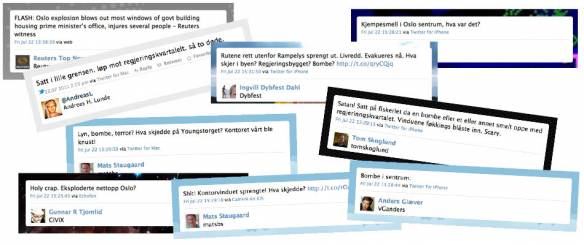 For my research on post-22/7 resilience and social media, I am drawing on data sources from the internet. Even though this data is publicly available, there are several ethical issues to be considered. A core controversy of internet-based research is the definition of public and private space: speakers may assume privacy online, which is not necessarily the case. Due to the use of screen names, it is for example impossible to guarantee that data was not produced by minors. In order to protect research subjects, it would seem feasible to consistently anonymize data. Some speakers, on the other hand, consider themselves authors or public agents who want to be quoted.
For my research on post-22/7 resilience and social media, I am drawing on data sources from the internet. Even though this data is publicly available, there are several ethical issues to be considered. A core controversy of internet-based research is the definition of public and private space: speakers may assume privacy online, which is not necessarily the case. Due to the use of screen names, it is for example impossible to guarantee that data was not produced by minors. In order to protect research subjects, it would seem feasible to consistently anonymize data. Some speakers, on the other hand, consider themselves authors or public agents who want to be quoted.
Internet-based research on the 22nd of July faces specific ethical problems, especially with regard to the immediacy and emotionality of the topic. After the attacks, authors were in shock and sorrow, undergoing a range of emotions in real-time – especially on twitter. Since emotions may generally be considered private, the discourses on the 22nd of July are even more sensitive than average internet communication. Even though it may have been precisely the public utterance of private emotions that allowed Norwegian society to create some form of solidarity, authors were presumably less conscious about the fact that they were speaking ‘in public’. On Facebook, for example, data published on private pages may be re-quoted and thereby migrate to the public realm. As such, social media can be used without knowing how quotable one’s words are.
It is our duty as researchers to assess whether something that has been uttered in extreme situations should be reproduced and, more importantly, whether victims should be exempted from such research in order to avoid double victimization through media exposure. Researchers must balance the need for rigorous methodology with the ethical integrity of their research subjects. For my own research, I have chosen to make ethical evaluations paying attention to the privacy of research subjects, reflecting on a case-by-case basis whether his/her data is public or private, as well as sensitive or not sensitive.